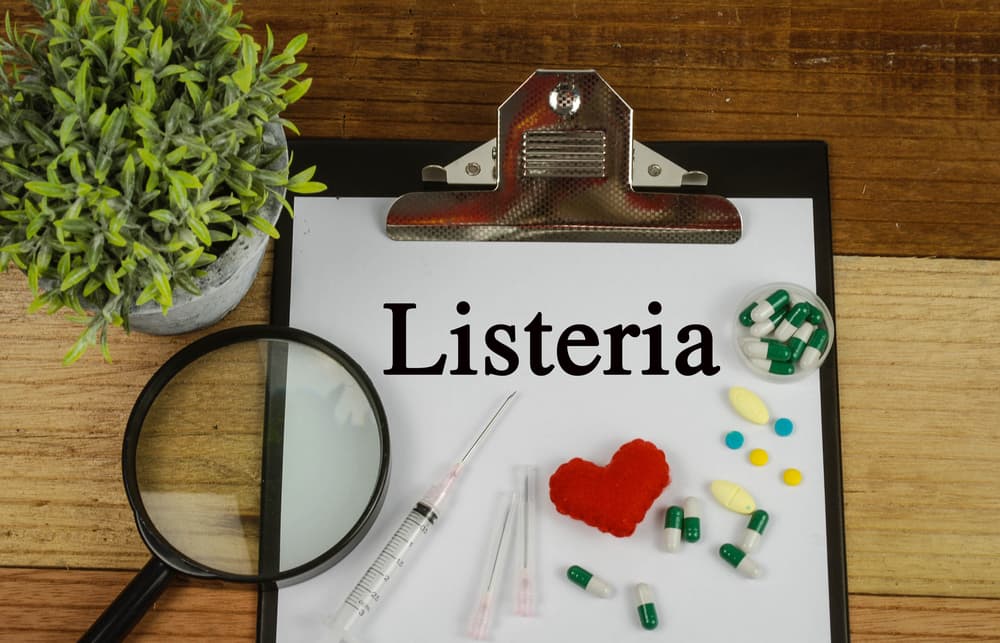The last thing you expect when eating some of your favorite foods is to get food poisoning. Most people expect the food they purchase to be free of bacteria such as Listeria, salmonella and others.
While anyone can contract Listeria, pregnant women, seniors, newborns, and those with a compromised immune system—such as those with cancer, kidney failure, or diabetes—are more likely to contract this form of food poisoning. Those who do contract Listeria almost always need hospitalization. About 260 of the reported cases in the United States are fatal.
What Is Listeria?
The bacteria Listeria monocytogenes lives in the intestines of animals, the soil and water plants. When people contract Listeria, it causes a potentially deadly infection called listeriosis. According to the Centers for Disease Control (CDC), about 1,600 people in the United States contract Listeria each year.
Symptoms of Listeria
The symptoms of Listeria are such that you might not realize you have it right away.
Symptoms include:
- Flu-like symptoms, including fatigue and muscle aches
- Fever
- Headaches
- Confusion
- Stiff neck
- Seizures
- Loss of balance
- Nausea
- Diarrhea
You might also exhibit complications such as hydrocephalus, meningitis, blindness, encephalitis, cranial nerve palsies, brain stem damage, pneumonia, septicemia, miscarriage, cervical cord compression, and stillbirth.
Types of Food Commonly Containing Listeria
You can reduce the risk of contracting Listeria if you wash your food or avoid eating them if ever in doubt. Some foods that might contain Listeria include deli meat, unpasteurized milk, soft cheese, smoked fish, ice cream, unpasteurized cheese, processed vegetables, raw vegetables, processed fruit, raw fruit, undercooked poultry, hot dogs, certain seafood, and sausages. Pet food might also contain Listeria.
Listeria Cases
Over the past couple of years, the United States had several outbreaks of Listeria.
Enoki Mushrooms
This outbreak affected enoki mushrooms, which are popular in Chinese, Japanese, and Korean food. Korea exported the mushrooms to the United States. The mushrooms affected have Utopia and Utopia Foods Inc. on the package’s front and have a bar code of 8928918610017.
Additionally, mushrooms from Shandong Youhe Biotechnology Co.'s had Listeria contamination. The package might include “Distributed by Sun Hong Foods, Inc” and “Producer: Shandong Youhe Biotechnology Co., Ltd.” According to the CDC, no one died from the outbreak, but there were three illnesses, all hospitalized, and the companies recalled the mushrooms.
The states affected were California, Michigan, and Nevada.
Deli Meat and Cheese
Hospitals in six states admitted thirteen out of sixteen people who contracted Listeria from eating deli meat and cheese. The CDC did not identify which deli meat and cheese had Listeria contamination but instead claimed that investigators could not identify a single food contaminated with Listeria.
The states affected were California, Illinois, Maryland, Massachusetts, New Jersey, and New York.
Old Europe Cheese
Hospitals across six states admitted five of six people who suffered food poisoning from Listeria after eating various products from Old Europe Cheese. Four of the five people who suffered Listeria food poisoning said they ate Camembert or brie cheese. The cheese includes Old Europe Cheese brie and Camembert, St. Louis brie and Old Europe Cheese baked brie with best-by dates of Dec. 14, 2022. If you have any of these cheeses in your freezer, discard them.
The states affected include California, Georgia, Massachusetts, Michigan, New Jersey, and Texas.
Vanilla Ice Cream
Hospitals admitted 27 of 28 people over 11 states contracted Listeria from eating Big Olaf vanilla ice cream. One person died in this Listeria outbreak. The ice cream was in Big Olaf retailers, senior homes in Florida, restaurants in Florida, and one location in Fredericksburg, OH. Big Olaf recalled the product in pint-size containers, 2.5-gallon scoopable stubs and plastic half-gallon containers.
The states affected include Colorado, Florida, Georgia, Illinois, Kansas, Massachusetts, Minnesota, Nebraska, New Jersey, New York, and Pennsylvania.
Dole Leafy Green Salad Products
Hospitals admitted 16 of 18 people who contracted Listeria over 13 states for eating contaminated Dole salad products. Of the 18 people who contracted the illness, three died. States affected included Ohio, Maryland, Pennsylvania, North Carolina, Michigan, Wisconsin, Iowa, Texas, Nevada, Utah, Minnesota, Oregon, and Idaho.
Fresh Express Packaged Salads
Ten people from eight states went to the hospital for admission after eating Fresh Express packaged salads. One person died as a result of suffering from Listeria. The states affected include Illinois, Massachusetts, Michigan, New Jersey, New York, Pennsylvania, and Ohio.
Tyson Foods Fully Cooked Chicken
Three people suffered food poisoning from Listeria-contaminated Tyson Foods fully cooked chicken and went to the hospital for care. Of those, one person died. The outbreaks were in Texas and Delaware.
Foods recalled included:
- Chicken strips
- Fully cooked pizza with chicken
- Pulled chicken
- Chicken salad sandwiches
- Diced chicken
- Chicken wraps
- Chicken wing sections
- Salads with chicken
Brands included:
- Tyson
- Casey’s General Store
- Jet’s Pizza
- Little Caesars
- Marco’s Pizza
- Circle K
Queso Fresco by El Abuelito Cheese Inc.
Of 13 people who contracted Listeria from eating Queso Fresco by El Abuelito Cheese, Inc., 12 went to the hospital for treatment, and one died. States involved included Connecticut, Maryland, New York, and Virginia.
Hard-Boiled Eggs
Hard-boiled eggs with a “Best If Used By” date of March 2, 2020, caused eight cases of Listeria with five hospitalizations and one death in five states: Maine, Texas, Pennsylvania, South Carolina, and Florida. The one death was in Texas. The eggs were from Almark Foods of Gainesville, GA. The company recalled the hard-boiled eggs because of the potential Listeria contamination. Over 30 brand names were affected by the recall for eggs used in food service and sold directly to consumers.
Pork Products From C. Corporation of Houston, Texas d/b/a Long Phung Food Products
A company based in Houston, Texas, was the subject of a Listeria outbreak in its pork products. Long Phung Food Products had several ready-to-eat pork products recalled because of Listeria contamination. In this outbreak, four people reported they had Listeria, and hospitals treated all four. Included in the recall was the company’s pork patty roll. All pork products with the establishment number “EST. 13561” in the USDA’s inspection mark were on the recall list.
States affected included Michigan, Tennessee, Texas, and Louisiana.
Deli Ham
Johnston County Hams, Inc., out of Smithfield, North Carolina, had to recall ham products due to a Listeria contamination. In this outbreak, four people reported suffering from the illness.
All four received treatment at hospitals, and one died. Some of the recalled products included the company’s Country Style Fully Cooked Boneless Deli Ham, Ole Fashioned Sugar Cured The Old Dominion Brand Hams Premium Fully Cooked Country Ham, Padow’s Hams & Deli, Inc., Fully Cooked Country Ham Boneless Glazed with Brown Sugar, and Premium Fully Cooked Country Ham Less Salt distributed by Valley Country Hams, LLC.
States affected by the outbreak and recall were Virginia and North Carolina.
Recovering Damages
You could recover damages after suffering from Listeria food poisoning or because you lost a loved one to Listeria food poisoning. Most people recover compensatory damages in the form of economic damages.
However, if you lost a loved one or suffered long-term or permanent disabilities due to complications from Listeria food poisoning, you could recover compensatory damages in the form of non-economic damages.
Economic Damages
Sometimes referred to as special damages, economic damages have a monetary value and include:
Medical Expenses: Depending on the severity of your illness, you might have extensive medical bills to pay. You could recover compensation or doctors’ appointments, surgeries, follow-up appointments, prescriptions, home health care, and expenses related to nursing home or rehabilitative home care.
You could also recover therapy appointment expenses for physical, psychological, occupational, and cognitive therapies. If doctors expect you to require continuing care because the Listeria caused long-term or permanent disabilities, you could also recover future medical expenses.
Lost Income: Most people who suffer from Listeria food poisoning end up in the hospital. Since you are not able to work during this time, you could recover compensation for the time you missed from work. If doctors expect Listeria food poisoning to cause long-term or permanent disabilities, you could also recover compensation for loss of future earning capacity.
Even if you can work part-time or your disabilities force you to take another job that pays less, you could still recover compensation for the partial loss of future earning capacity. In most cases, food poisoning victims who suffered complications or who lost a loved one could collect compensation until the day they would normally retire.
Death-Related Expenses: If you lost a loved one to Listeria food poisoning, you could recover compensation for funeral and burial expenses, cremation expenses, and certain probate court fees. If you retain a probate court attorney, you could also recover compensation for the probate attorney’s fees and costs.
Non-Economic Damages
Sometimes referred to as general damages, non-economic damages do not have a monetary value.
Generally, you must have long-term or permanent disabilities or have lost a loved one due to Listeria food poisoning to recover non-economic damages, including:
- Pain and suffering, including emotional distress from a long recovery time or the loss of a loved one.
- Loss of quality of life if you have to make lifelong changes such as taking prescriptions, using ambulatory aids, or going to a therapist.
- Loss of use of a body part such as an arm or foot.
- Loss of use of a bodily function such as your hearing, eyesight, or bladder.
- Loss of companionship if your long-term or permanent disabilities do not allow you to spend quality time with your family or attend family activities and events.
- Loss of consortium if you can no longer enjoy a physical relationship with your spouse.
- Inconvenience if your long-term or permanent disabilities force you to hire someone to do the chores you usually do, including but not limited to lawn maintenance, grocery shopping, house cleaning, and home repair and maintenance.
- Disfigurement and/or excessive scarring.
Injuries From Commercial Food

When you purchase commercially made food, you expect it to be free from bacteria and pathogens, including Listeria. Foodborne illnesses and death cause you or your loved ones to have a pile of medical expenses, loss of work, and other damages.
A personal injury lawyer could help you recover the compensation you deserve. Although that compensation does not cure you or bring back a loved one, it significantly reduces the financial stress from lost income.
If you suffered illness or lost a loved one due to Listeria food poisoning, contact a product liability attorney for a free case evaluation.
